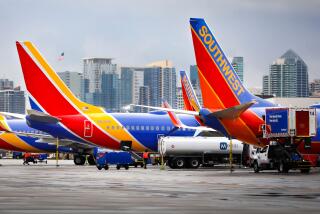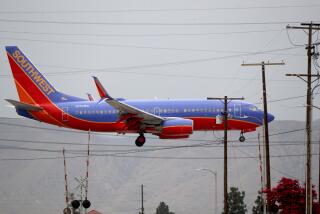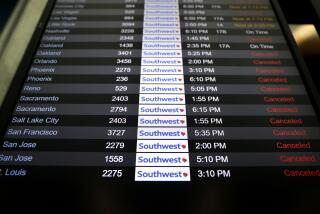Budget battles could slow 2014 business travel spending, group warns
Spending on business travel is expected to surge in 2014, a sign of continuing confidence in the U.S. economy. But the rosy business outlook could be marred by further feuding in Washington that leads to another government shutdown.
The message of caution came from a survey released last week by the Global Business Travel Assn., the trade group in Virginia for corporate travel managers.
Based on business indicators, the group predicted $288.8 billion in spending in the U.S., which would be a 7.2% jump over 2013. It represents 459 million trips for the year, which would be a 1.6% increase from 2013.
During the depths of the recession, that number dropped to 434 million person-trips in 2009. The industry still has a long way to go to come near the high of 576 million business trips in 2000.
The study results were released a few days before Congress and the White House reached an agreement to settle a 16-day partial shutdown. But the budget deal is temporary, raising the chance of another deadlock in January or February that the business travel group fears could slow the nation’s economic momentum.
“Another self-destructive U.S. government shutdown will absolutely have negative consequences for business travel and the economy as it would only further damage our country’s reputation as a place to do business,” said Michael McCormick, the travel group’s executive director and operations chief. “It is critical to this country’s future position as a leader in the global economy that our elected officials work to keep the U.S. open for business.”
Nonstop flights from Dallas’ Love Field sure to spark airfare battle
An airline battle is about to heat up in Texas as a result of a little-known law set to expire next year. The good news is that airline passengers should claim the spoils in the form of lower fares.
The so-called Wright Amendment, championed by then U.S. Rep. Jim Wright (D-Texas) in 1979, was intended to restrict airline traffic out of Dallas Love Field and direct more growth toward the then-fledgling Dallas-Fort Worth International Airport. The legislation was supported by business interests in Dallas.
The amendment has had direct consequences for Southwest, which is headquartered at Love Field and operates one of its biggest hubs at the airport.
Over the years, many of the Wright Amendment’s restrictions have phased out. The last limit prohibits nonstop flights from Love Field to 41 states, plus the District of Columbia.
Once the last restriction expires Oct. 13, 2014, Southwest is expected to add many new nonstops from Love Field, putting the low-cost airline in direct competition with American Airlines, based at nearby Dallas-Fort Worth International Airport.
“Where Southwest decides to take on American Airlines we are likely to see spirited competition and cheaper prices for both leisure and business travelers,” said Rick Seaney, founder of the travel website Farecompare. “American Airlines will be very aggressive in keeping its lucrative business customers. Look for them to use price matching, loyalty miles, upgraded aircraft and increased flight frequencies.”
Southwest can’t wait for the Wright Amendment to expire.
In the lobby of its Love Field headquarters, the airline has installed a countdown clock that will reach zero Oct. 13. The slogan “Nonstop Love” is emblazoned on the clock.
“Southwest will bring our legendary fares to these new nonstops,” said Southwest spokeswoman Whitney Eichinger. “Having Southwest in these nonstop markets will create competition and fares that will be good for consumers.”






